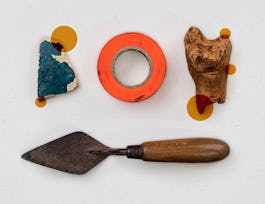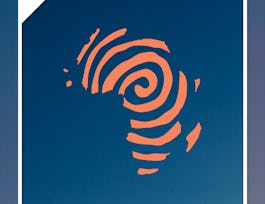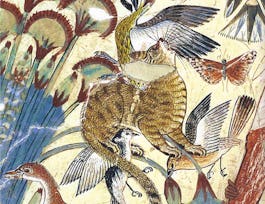Archaeology is, among human sciences, the discipline with the strongest importance for the rediscovery, but also for the preservation and protection of cultural heritage, as Humankind’s universal patrimony. You will be introduced to the way we ourselves reflect on and are engaged with the study of human past: from the practical and material recovery of ancient traces in the field to the study and interpretation. On the other hand, the discovery of human past implies the correct conservation and presentation for both experts and general public: the study and protection of the past we share every day prevent from any possible destruction, misuse, abuse and thus cancellation of human memory.


Recovering the Humankind's Past and Saving the Universal Heritage
Taught in English
Some content may not be translated
16,310 already enrolled
(269 reviews)
Details to know

Add to your LinkedIn profile
10 quizzes
See how employees at top companies are mastering in-demand skills


Earn a career certificate
Add this credential to your LinkedIn profile, resume, or CV
Share it on social media and in your performance review

There are 9 modules in this course
The inter-disciplinary perspective of Archaeology, the Ebla discovery, the use of ICT technologies and the introduction of the Europeana Data Model as a framework for collecting, connecting and enriching data will be the focus of the course.
What's included
8 readings
We will start our enquiry by discussing how ancient societies kept memory of their own past, an aspect which, in fact, was fundamental to their identity. Shifting towards modern times, we will then reflect how the material past is preserved and how we refer to it. Homework available since
What's included
4 videos1 quiz
The study of the past of the planet marked the first serious reflections on humankind’s past, although archaeology was in fact considered the practice to collect objects. “New Archaeology” represents the first major revolution, promptly followed by the more structured and aggressive “Processual Archaeology". The opening towards different disciplines implied the “loss of innocence” for archaeology, bringing at the same time scientific methods into the reconstructions of the past. Homework available since
What's included
4 videos1 quiz
Field archaeology entails discovery, but is a matter of fact that discovering brings a great responsibility because it is a process of destruction. Digging means observing, recording, interpreting. Archaeological excavation is an harmonious trade-off between an intellectual and a manual labor. In fact, archaeological interpretation is a path shifting between identity and alterity. Homework available since
What's included
3 videos1 quiz
Material remains of the past and their state of recovery vary according also to environments. Surface surveys lead to a more intense knowledge of territories, visualizing archaeologicallandscapes in a variety of ecological situations. The objectives of archaeological research have been moulded in the historical development of the discipline. Historical sources have always been a sourceof inspiration for research, opening new problems. Chronology is a construct depending on dating tools, and scientific methods have been employed in determining an absolute chronology. Homework available since
What's included
4 videos1 quiz
This module focuses on scientific research and knowledge dissemination.The specificities of the past pose a problem in respect of popularization and simplification. The operational chain is made of exploration, dig, publication, conservation, dissemination, protection. However, the need for a legitimacy of the present has led also to political readings of the retrieval of the past. Present cultural identity is grounded in the retrieved past. The “past of the other” has often been refused throughout history down to modern times. Our perception of the past is made manifest in its material and virtual reconstruction starting from ruins. Further, “excessive exploitation” of the past represent a modern destruction. The archaeological excavation of Ebla (Syria) will be analyzed as case study. It is in fact an example of a research framed within historical archaeology, which, in the course of fifty years of research, turned into a global perspective. Homework available since Dic.: Quiz week 5
What's included
3 videos1 quiz
In this module, Emanuel Demetrescu will explain us the last methodologies and techniques in the field of 3D acquisition and reconstruction of cultural heriatage. These applications improve the knowledge and preservation and have a central role in the way we can communicate cultural heritage to the society. Making digital copies from real objects now has several very fun and precise technologies that are also available to everybody at very low cost budget. Demetrescu will show us how to use these tools to make our own models and share them with others. The virtual reconstruction of no-more-exstant objects (like a lost temple) will be the argument of the last part of the module: a state of the art of the methodologies will help us to understand how to approach such a process from a scientific point of view (archaeological method). Homework available since 1 Jan.: Quiz week 6
What's included
4 videos1 quiz
In this module, Andrea Vitaletti will show us the basic techniques to effectively manage the unprecedented amount of digital contents on cultural objects nowadays offered by cultural heritage providers. Raw data, need to be organized in structured information in order to effectively support advanced functionalities, such as indexing and searching. We will present the basic techniques to structure the data in order to facilitate the access to digital contents and we will focus on the European Data Model, a framework for collecting, connecting and enriching data on cultural objects provided by a number of museum, archives, sites and libraries in Europe. Homework available since
What's included
4 videos1 quiz
This module deals with some basic issues and principles. All heritages are “equal among them”. Heritages are a property of humankind and not of the single countries. Heritages need to be protected and preserved in their context. But many threats are posed to heritages: illegal digging is a serious risk, as well as actions due to hatred for the “other” and his heritage. As a consequence of what stated above, damages to heritage are a crime against all humankind. International Organizations are engaged in protecting the heritage, the future of which represents a contribution to dialogue and peace. Homework available since
What's included
3 videos3 quizzes
Instructors



Offered by
Recommended if you're interested in History

Rice University

Universitat Autònoma de Barcelona

Università Bocconi

Sapienza University of Rome
Why people choose Coursera for their career




Learner reviews
Showing 3 of 269
269 reviews
- 5 stars
63.56%
- 4 stars
20.44%
- 3 stars
8.17%
- 2 stars
5.57%
- 1 star
2.23%

Open new doors with Coursera Plus
Unlimited access to 7,000+ world-class courses, hands-on projects, and job-ready certificate programs - all included in your subscription
Advance your career with an online degree
Earn a degree from world-class universities - 100% online
Join over 3,400 global companies that choose Coursera for Business
Upskill your employees to excel in the digital economy
Frequently asked questions
Access to lectures and assignments depends on your type of enrollment. If you take a course in audit mode, you will be able to see most course materials for free. To access graded assignments and to earn a Certificate, you will need to purchase the Certificate experience, during or after your audit. If you don't see the audit option:
The course may not offer an audit option. You can try a Free Trial instead, or apply for Financial Aid.
The course may offer 'Full Course, No Certificate' instead. This option lets you see all course materials, submit required assessments, and get a final grade. This also means that you will not be able to purchase a Certificate experience.
When you purchase a Certificate you get access to all course materials, including graded assignments. Upon completing the course, your electronic Certificate will be added to your Accomplishments page - from there, you can print your Certificate or add it to your LinkedIn profile. If you only want to read and view the course content, you can audit the course for free.
You will be eligible for a full refund until two weeks after your payment date, or (for courses that have just launched) until two weeks after the first session of the course begins, whichever is later. You cannot receive a refund once you’ve earned a Course Certificate, even if you complete the course within the two-week refund period. See our full refund policy.



